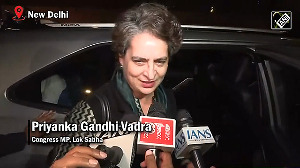PET MRI, a new cancer screening test can detect the disease in the body with greater accuracy. It can also chart out the possible course of malignancy in the future
Suspecting that all was not well, a 42-year-old woman recently underwent a breast scan at one of Delhi’s leading hospitals. The scan revealed that she had a malignant tumour.
Ordinarily, doctors would have conducted a surgery to conserve the breast, removing just the cancerous growth and not the entire breast. In this case, however, they opted for total mastectomy. That’s because the super-specialised scan that the woman was subjected to had not only detected the existing cancer, but it had also disclosed how the cancer would grow and extend in the future. 
It had caught the cancer’s field. And it had picked up three other cancer hotspots which a regular magnetic resonance imaging, or MRI, would have missed. Called PET MRI, this specialised cancer diagnostic technology has changed the treatment line altogether by arming doctors with far more accurate data concerning cancer in their patients. It has also made it feasible to detect the possibility of a perfectly healthy individual having cancer in the future.
“It can maybe pick up a cancer as early as five years or more,” says Shubham Sogani, the CEO of House of Diagnostics and PET Suite at Indraprastha Apollo Hospital in Delhi. PET, or positron emission tomography, is a nuclear medicine imaging technique. Here is how it works. A biological radioactive material is injected into the body. The most commonly used
radioactive material is FDG, or fluorodeoxyglucose, a glucose molecule. The patient is made to fast overnight so that “when he comes for the scan, he is starving and the body requiresglucose,” says Sogani.
The patient is now subjected to the radioactive glucose molecule. In about 45 minutes, the glucose is distributed throughout the body. Under the scan, anything that is normal shows a particular pattern of glucose uptake, while an anomalous pattern indicates an abnormality. That abnormality can be a cancer or an infection. “Normally, cancers and infections are rapidly multiplying cells. When anything multiplies rapidly, it needs more energy and, hence, its consumption of glucose is automatically higher,” explains Sogani. Based on this fundamental, the radioactive glucose molecules get concentrated in the problem area. When the patient is put under the scanner, the machine detects the high degree of radiation in that problem area. The intensity, direction and angle of the radiation hitting the scanner are picked up in 3D and the source is figured out.
When this information is fused with an MRI scan, it gives the precise location of the cancer in the body. “PET tells us ‘yes, this is cancer’. And PET plus MRI tells us the specificity and extent of the cancer,” says Sogani. There are over a thousand types of cancers. But routine whole-body checkups scan for only five or six types of prevalent cancers like breast, cervical, prostate or lung. In comparison, PET MRI, which is also a whole-body scan, picks up cancers or infections in any part of the body and with a greater precision. The facility at Apollo is a simultaneous PET MRI. This means that the PET scan and MRI scan are conducted simultaneously and the data from the two is picked up simultaneously. Hence, the diagnosis is highly accurate. The person is also subjected to only one scan which lasts for 45 to 60 minutes. 
How much does it cost?
Whole-body PET MRI using FDG for screening cancer in a healthy individual: Rs 35,000
Whole-body PET MRI using FDG for detailed test for suspected or known cancer cases: Rs 55,000
Detailed PET MRI using FDG for a particular area, including brain and spine: Rs 40,000 to Rs 45,000
PET MRI using super-molecules like FET: Rs 45,000 (currently) In India, the PET MRI test costs about one-seventh of what it does anywhere else in the world. In Singapore, for example, the test costs $S 4,000 (around Rs 2 lakh); in Europe, it costs euro 3,000-4,000 (Rs 2.3 lakh to Rs 3 lakh); and in the US, it is about Rs 4 lakh. This explains the number of patients from Europe, Africa and West Asia coming to Delhi for the test.










